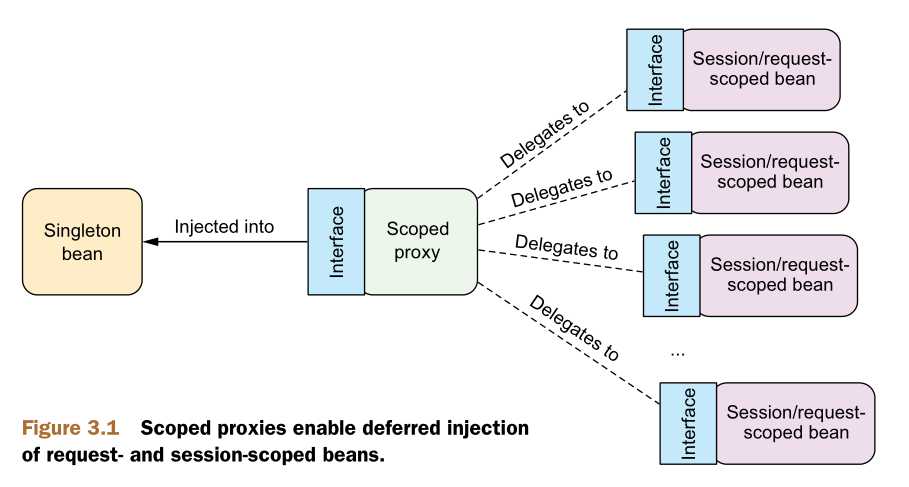标签:
一、
Spring的bean默认是单例的
But sometimes you may find yourself working with a mutable class that does main-
tain some state and therefore isn’t safe for reuse. In that case, declaring the class as a
singleton bean probably isn’t a good idea because that object can be tainted and cre-
ate unexpected problems when reused later.
Spring defines several scopes under which a bean can be created, including the
following:
? Singleton—One instance of the bean is created for the entire application.
? Prototype—One instance of the bean is created every time the bean is injected
into or retrieved from the Spring application context.
? Session—In a web application, one instance of the bean is created for each session.
? Request—In a web application, one instance of the bean is created for each request.
二、@Scope的三种用法
1.在自动扫描中
1 @Component 2 @Scope(ConfigurableBeanFactory.SCOPE_PROTOTYPE) 3 public class Notepad { ... }
2.在java配置文件中
@Bean @Scope(ConfigurableBeanFactory.SCOPE_PROTOTYPE) public Notepad notepad() { return new Notepad(); } ww
3.在xml配置文件中
<bean id="notepad" class="com.myapp.Notepad" scope="prototype" />
三、
若不指明proxyMode,当把一个session或request的bean注入到sigleton的bean时,会出现问题。如把购物车bean注入到service bean
1 @Component 2 @Scope( 3 value = WebApplicationContext.SCOPE_SESSION, 4 proxyMode = ScopedProxyMode.INTERFACES) 5 public ShoppingCart cart() {... }
@Component public class StoreService { @Autowired public void setShoppingCart(ShoppingCart shoppingCart) { this.shoppingCart = shoppingCart; } ... }
因为StoreService是signleton,是在容器启动就会创建,而shoppingcart是session,只有用户访问时才会创建,所以当StoreService企图要注入shoppingcart时,很有可能shoppingcart还没创建。spring用代理解决这个问题,当ShoppingCart是接口时,指定 ScopedProxyMode.INTERFACES。当ShoppingCart是一个类时,则指定ScopedProxy- Mode.TARGET_CLASS,srping会通过CGLib来创建基于类的代理对象。当request注入到signleton bean时,也是一样。

在xml中声明proxy策略
1 <?xml version="1.0" encoding="UTF-8"?> 2 <beans xmlns="http://www.springframework.org/schema/beans" xmlns:xsi="http://www.w3.org/2001/XMLSchema-instance" xmlns:aop="http://www.springframework.org/schema/aop" xsi:schemaLocation=" 3 http://www.springframework.org/schema/aop 4 http://www.springframework.org/schema/aop/spring-aop.xsd 5 http://www.springframework.org/schema/beans 6 http://www.springframework.org/schema/beans/spring-beans.xsd"> 7 8 <bean id="cart" class="com.myapp.ShoppingCart" scope="session"> 9 <aop:scoped-proxy /> 10 </bean> 11 </beans>
<aop:scoped-proxy> is the Spring XML configuration’s counterpart to the @Scope
annotation’s proxyMode attribute. It tells Spring to create a scoped proxy for the bean.
By default, it uses CGL ib to create a target class proxy. But you can ask it to generate an
interface-based proxy by setting the proxy-target-class attribute to false :
<bean id="cart" class="com.myapp.ShoppingCart" scope="session"> <aop:scoped-proxy proxy-target-class="false" /> </bean>
SPRING IN ACTION 第4版笔记-第三章ADVANCING WIRING-005-Bean的作用域@Scope、ProxyMode
标签:
原文地址:http://www.cnblogs.com/shamgod/p/5236060.html